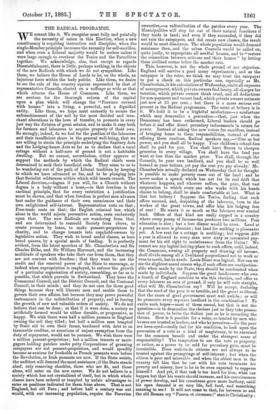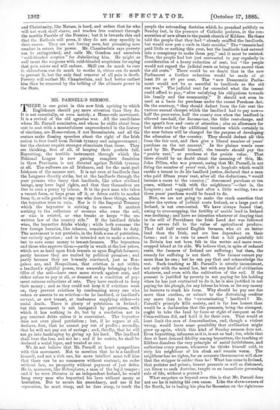THE RADICAL PROGRAMME.
WE cannot like it. We recognise most fully and painfully the necessity of union in this Election, when a new constituency is requiring instruction and discipline, when the single-Member principle increases the necessity for sell-sacrifice, and when even a Liberal majority would be useless unless it were large enough to overbear the Tories and the Parnellites together. We acknowledge, also, that except as regards Disestablishment, there is little, perhaps nothing, in the objects of the new Radicals with which we do not sympathise. Like them, we believe the House of Lords to be, on the whole, an injurious force within the body politic. Like them, we desire to see the rule of the country squires superseded by that of representative Councils, elected on a suffrage as wide as that which returns the House of Commons. Like them, we are anxious for the thorough reform of the capital upon a plan which will change the "Province covered with houses" into a living, a powerful, and a dignified entity. Like them, we hope most earnestly to secure the enfranchisement of the soil by the most decided and tren- chant alterations in the laws of transfer, to promote in every just way the division of great estates, and to make it easy both for farmers and labourers to acquire property of their own. So strongly, indeed, do we feel for the position of the labourers and their insufficient share in the general well-being, that we are willing to strain the principle underlying the Sanitary Acts and the Lodging-house Acts so far as to declare that a rural cottage without a half-acre of ground is not a habitable dwelling. But we cannot, nevertheless, either approve or support the methods by which the Radical chiefs seem determined to seek their beneficial ends. They seem to us to be wandering out of the path of Liberal tradition by keeping to which we have advanced so far, and to be plungiag into that Socialist wilderness within which wild beasts crouch. The Liberal doctrine,—dogma if you will, for a Church without dogma is a body without a bone,—is that freedom is the cardinal principle, that for every restriction a justification must be shown, and that when freedom is perfect men advance best under the guidance of their own consciences and their own enlightened self-interest. Representation rests on that ; Free-trade rests on that; the English criminal law, which alone in the world rejects preventive action, rests exclusively upon that. The new Radicals are wandering from that, and are determined to remould Society from above, to create yeomen by loans, to make peasant-proprietors by charity, and to change tenants into copyhold-owners by legislative action. They wish to breed useful classes, as bees breed queens, by a special mode of feeding. It is perfectly evident, from the latest speeches of Mr. Chamberlain and Sir Charles Dilke, and Sir William Harcourt, and the increasing multitude of speakers who take their cue from them, that they are not content with freedom ; that they want to use the credit and the reserved power of the State to encourage, or indeed when expropriation is employed, to enforce the growth of a particular organisation of society, resembling, so far as is possible, that which prevails in Switzerland. They have the Communal Council, and the District Council, and the Cantonal Council, in their minds ; and they do not care for those good things because they will liberate men and enable them to govern their own affairs, but because they may prove powerful instruments in the redistribution of property, and in forcing the growth of new and valuable orders of society. We do not believe that can be done ; or that if it were done, a society so artificially formed would be either durable, or progressive, or happy. We wish there were half a million yeomen in England owning the soil they tilled ; but half a million men tempted by State aid to own their farms, burdened with debt to an inexorable creditor, or conscious of unjust exemption from the duty of repayment, would not be yeomen. We wish there were a million peasant-proprietors ; but a million tenants or mort- gagors holding patches under petty Corporations of groaning ratepayers are not peasant-proprietors, and would speedily become as anxious for freeholds as French peasants were before the Revolution, or Irish peasants are now. If the State assists, the unfittest will demand the most assistance ; if the State stands aloof, only removing shackles, those who are fit, and those alone, will enter on the new career. We do not believe in a society which has not crystallised of itself, but in which whole classes have been ordered or tempted by unfair advantages to enter on positions indicated for them from above. That is not England, but old Peru ; and before half a century was out would, with our increasing population, require the Peruvian corrective,—a redistribution of the patches every year. The Municipalities will step far out of their natural functions if they trade in land; and even if they succeeded, if they did not ruin the ratepayers, and did create new classes, the result would be most disastrous. The whole population would demand assistance then, and the urban Councils would be called on, quite justly, to expropriate all needful houses, and to "restore the connection between artisans and their homes" by letting them civilised rooms below the market rate.
This, however, is not the whole ground of our objection. England will survive a good many experiments ; and as the ratepayer is the voter, we think we may trust the ratepayer to put a check on this particular one, especially as Mr. Chamberlain,in his calculations of Wednesday, omits all expenses of management, which private owners find heavy, all charges for taxation, which private owners think cruel, and all deductions for non-payment and vacant land, which private owners estimate just now at 25 per cent. ; but there is a more serious evil present in the Radical programme. The scent of bribery is in it. We hold it to be a frightful misfortune—a misfortune which may demoralize a generation—that, just when the Democracy has been enthroned, Liberal leaders should go before it and offer direct pecuniary inducements in return for power. Instead of asking the new voters for sacrifices, instead of bringing home to them responsibilities, instead of even offering them cautions, Radical speakers say,—' Give us but power, and you shall all be happy. Your children's school-fees shall be paid for you. You shall have Stores to cheapen groceries in every village. You shall have the land you want at less than the market price. You shall, through the Councils, be your own landlord, and you shall be as well housed as your betters, yet pay the rent you pay already.' Mr. Chamberlain actually declared on Wednesday that he thought it possible to make poverty cease out of the land ; and he never makes a speech which has not for its real drift that whatever happens, and whoever suffers, the poor, that vast corporation to which every one who works with his hands claims to belong, shall be made comfortable at last. What is that but bribery? Suppose the Tories, finding that such offers succeed, and, despairing of the labourer, turn to the worker of the great towns, and offer him his lodging free of rent ! He wants it as much as the labourer ever wanted land. Offers of that kind are easily capped in a country where every penny of Income-tax produces two millions. Free education is nice ; but a free dinner would be nicer. Land at a pound an acre is pleasant ; but land for nothing is pleasanter yet. A low rent for a cottage is soothing ; but suppose £20 a year is allowed to every man over sixty as commuted pay- ment for his old right to maintenance from the Union We cannot see any logical halting-place to such offers, until, indeed, the Commune, owning all property and drawing all income, shall divide among all a livelihood porportioned not to work or even to merit, but to needs. Louis Blanc was logical. Nor can we see the slightest moral reason why,if such offers are unobjection- able when made by the State, they should be condemned when made by individuals. Suppose the great landowners who ONVI1 a fourth of England combine to win this election, and offer to every labourer an acre of ground, if only he will vote straight, what will Mr. Chamberlain say Will he accept, declaring that the need of the poor is so terrible, and the grant so liberal,
that the cause of good government must wait awhile ; or will he prosecute every separate landlord in the combination? To excite such hopes—most of them unreal, but that is not the question—is to demoralise the electors just as they take posses- sion of power, to bribe the Sultan just as he is ascending the throne. How is it possible for a voter, so treated by men who he sees are trusted as leaders, and who he perceives—for the poor are keen-eyed—really feel for his condition, to look upon the possession of a vote as a kind of magistracy, to be exercised for the common benefit and under the strongest sense of responsibility? The temptation to use the vote as property, or rather, as a power to be sold for pecuniary gain, must be irresistible. Even well-to-do citizens are not always to be trusted against the promptings of self-interest ; but when the citizen is poor and miserable, and when the ablest men in the country tell him that he can with his vote terminate his poverty and misery, how is he to be even expected to suppress himself And yet, if that task is too hard for him, what can happen but that his wants should increase, and his consciousness of power develop, and his conscience grow more leathery, until his open demand is an easy life, full food, and something amusing to see ? It will not come to that, for between us and the old Roman cry " Panem et circenses !" stands Christianity ;
and Christianity, like Nature, is hard; and orders that-lie- who will not work shall starve, and teaches free contract through the terrible Parable of the Pennies-; but it is towards-this end- that the Radicals will press, it they do not stop speedily in their career. They are not freeing men, but promising men comfort in return for power. Mr. Chamberlain- says poverty can be extinguished, and calls Mr. Goschen and ourselves. "cold-blooded sceptics "'for disbelieving him. He might as well taunt the surgeons with cold-blooded scepticism for saying- that pain exists and will endure. Skill can do much to cure it, chloroform. can do much to soothe it, virtue can do much to prevent it, but the only final remover of all pain is death. Poverty will outlast Mr. Chamberlain, and had better outlast him than be removed by the bribing of the ultimate power in the State.



































 Previous page
Previous page